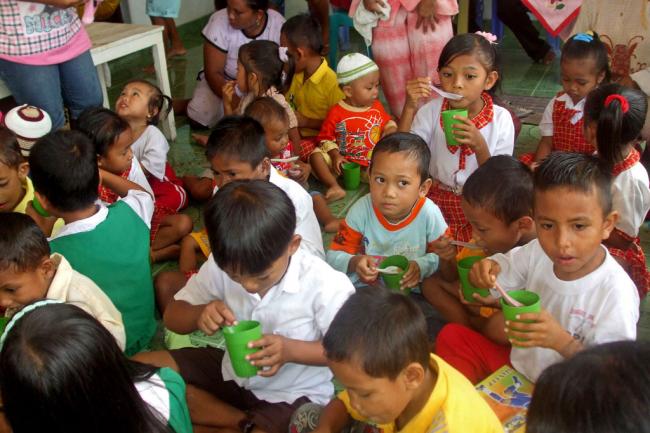
UNICEF, World Bank urge greater investment in early childhood development
The two organizations said in a press release that they have established a new alliance that aims to make early childhood development a global policy, programming and public spending priority, to give all young children access to quality services that improve their health, nutrition, learning ability and emotional well-being.
Advances in neuroscience and recent economic studies show that early childhood experiences have a profound impact on brain development and on subsequent learning, health, and adult earnings. Children who are poorly nourished and nurtured, or those who do not receive early stimulation, are likely to learn less in school and earn less as adults.
Childhood stunting is a development and economic emergency
Globally, millions of children under the age of five are at risk of never reaching their full developmental potential. One out of four children under five (159 million) are stunted due to poor nutrition, with numbers significantly higher in parts of Africa and South Asia. Nearly half of all three- to six-year-olds don't have access to pre-primary education. In Sub-Saharan Africa, 80 per cent are not enrolled in pre-primary programmes.
“The time has come to treat childhood stunting as a development and an economic emergency,” said World Bank Group President Jim Yong Kim, noting that countries cannot compete in a more digitalized global economy in the future if a third or more of their children are stunted.
“Our failure to make the right investments in early childhood development is condemning millions of children to lives of exclusion,” he said, adding: “We can't promise to equalize development outcomes, but we can insist on equalizing opportunity.”
Stress can inhibit brain development
Emerging scientific evidence also shows that prolonged exposure to adversity, such as that experienced by children growing up in countries affected by conflict or households affected by domestic violence, can cause toxic stress, a condition that can also inhibit peak brain development in early childhood.
“What we are learning about all the elements that affect the development of children's brains, whether their bodies are well nourished, whether their minds are stimulated, whether they are protected from violence, is already changing the way we think about early childhood development,” said UNICEF Executive Director Anthony Lake. “Now it must change the way we act.”
A 20-year study in Jamaica showed that disadvantaged young children who were exposed to high-quality early stimulation interventions as infants and toddlers earned up to 25 per cent higher wages as adults, equivalent to adults who grew up in wealthier households.
Early childhood development is also an investment in economic growth. Evidence suggests that an additional dollar invested in quality early childhood development programmes yields a return of between $6 and $17.
Early childhood development included in global development goals
Recognizing the growing understanding of ECD's importance, the Sustainable Development Goals (SDGs), adopted last year by UN Member States, include an early childhood development target, the first time it has been explicitly included in global development goals. The target is to increase the percentage of children under five years of age who are developmentally on track in health, learning and psychosocial well-being.
Although early childhood development falls under Goal 4 of the SDGs, it provides a natural link to other goals, including poverty reduction, health and nutrition, women and girls' equality, and ending violence.
Photo: World Bank/Erly Tatontos
Support Our Journalism
We cannot do without you.. your contribution supports unbiased journalism
IBNS is not driven by any ism- not wokeism, not racism, not skewed secularism, not hyper right-wing or left liberal ideals, nor by any hardline religious beliefs or hyper nationalism. We want to serve you good old objective news, as they are. We do not judge or preach. We let people decide for themselves. We only try to present factual and well-sourced news.







